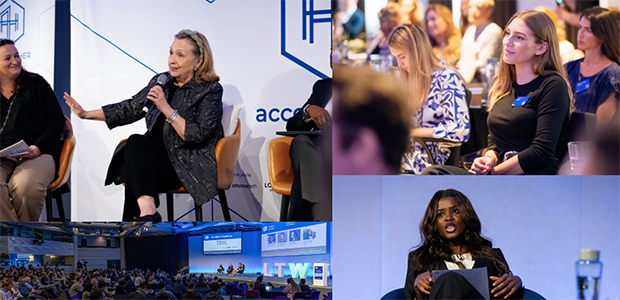
Women’s tech careers suffered due to cost-of-living crisis and COVID
Despite efforts of businesses to improve gender equality in the workplace, women are still unequally impacted by COVID and the cost-of-living crisis. The pandemic and current economic conditions have acted as major barriers towards women succeeding in technology related careers, new research suggests.
In 2023, over half (52%) of respondents believed women missed out on work opportunities, were forced to scale down work and take time off to care for children as well as undertaking more household chores during the pandemic and economically challenging times.
This is according to fresh data obtained by London Tech Week, which celebrates its tenth anniversary this year, and takes place from 12-16 June 2023. Anchor events include EQL:HER, a network of women visionaries addressing the underrepresentation of women in tech.
Whilst women experience gender bias in the tech sector, overall, unemployment in the tech ecosystem is not as big a problem as the media would have us believe.
Just 2% of tech workers were made redundant over the past 24 months whilst 11% are now working full time when they used to be unemployed. A further 16% are now working full time when they used to work part time, illustrating how job roles are changing.
Working more than one job is increasingly commonplace - 15% revealed they used to be self-employed or own a business but have now taken another job whilst running their business on the side.
However, there is stagnation in roles as 32% of those in tech reveal they haven’t received a promotion for more than 24 months, perhaps due to the economic climate.
Lack of funding for women in tech
Women are light years away from achieving equality when it comes to obtaining funding. Having a greater amount of women-focused business events and awards is perceived as one of the most powerful initiatives which has helped women-led start-ups get better access funding over the last 24 months. This is closely followed by more women in tech being championed in the press (55%).
Sadly, 42% of respondents believed it was more difficult for women to secure a pay rise in tech, whilst 38% said it was more difficult for women to achieve senior leadership or board positions.
Respondents also cited:
- A skills shortage is believed to be the biggest obstacle to women entering the sector (68%)
- Limited access to STEM (64.4%) and the cost-of-living crisis also have had an effect
The impact of the cost-of-living crisis
However, the cost-of-living crisis and the long-term impact of the COVID-19 pandemic on women in the workplace isn't helping.
Almost half (43%) believe women are more likely than men to have been denied access to financial support from governments whilst a further 43% perceive women as shouldering most of the burden of childcare or care of other dependants in their households whilst juggling work responsibilities.
What can be done?
Women would like to see better visibility and promotion of STEM career opportunities for women to help more women break into and thrive in the tech industry. This would help achieve more gender equity with their male counterparts in the sector (39% of respondents revealed) as well as more equal pay between genders (38%) and better flexible work opportunities (37%).
This year’s International Women’s Day theme is ‘Innovation and technology for gender equality’ and 5G, 4G and Mobile Technology is perceived as the most important innovation over the last 10 years which has had the biggest impact on gender equality (43%).
Looking ahead, respondents believed HealthTech solutions technologies would have the biggest impact on women’s lives and gender equality over the next ten years.
Laura Stebbing, CEO at EQL:HER at London Tech Week’s conference said: “Despite the efforts of many businesses and organisations towards gender parity in the tech sector, there is still lots more to be done. Women for example are far behind men when it comes to investment in women led startups. Gender disparity needs to be addressed from a systemic level. Supporting women at just one level is not going to solve the problems.
"We need to be looking at early-stage solutions including better investment in STEM, high profile women in tech being visible to young people and better access to skills programmes. It can't be just one of these interventions, it needs to be all of them. Society shapes stereotypes and creates biases that we need to address well before women even enter the workforce.”
Tessa Clarke, London Tech Week ambassador and founder of Olio said “If there's one industry that should be leading in terms of gender parity, it's the tech industry. That's because the tech industry has the tools to enable flexible and autonomous working, it has the dynamism and relative youth to make change more easily, and it naturally attracts the visionaries and disruptors who don't tend to be happy with the status quo.
"It's therefore incredibly disappointing to see this data which shows that the industry has not yet seized the gender parity opportunity. I very much hope that this International Women's Day the tech industry will resolve to make proper strides in gender parity, so we won't be lamenting the same lack of progress next year.”

